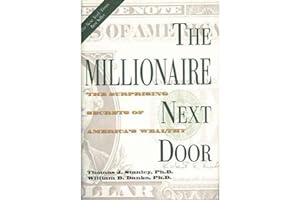One sentence summary:
The Millionaire Next Door by Thomas J. Stanley is a revealing and informative book that explores the surprising secrets of America’s wealthy and uncovers the key characteristics and behaviors that contribute to their financial success.
Book genre:
Non-fiction, personal finance, self-help
Main topic of the book:
The Millionaire Next Door focuses on the study and understanding of America’s self-made millionaires and how they were able to achieve and maintain their wealth. This book challenges the common perception of millionaires being flashy and extravagant and instead presents a portrait of the average millionaire as a hard-working, disciplined, and frugal individual.
Key ideas:
- The majority of millionaires in America are self-made and live modest, unassuming lives.
- A common trait among millionaires is their ability to control their spending and prioritize saving and investing for the long-term.
- Being financially independent and accumulating wealth is a result of having the right mindset and making wise decisions, not luck or inheritance.
- Social status and material possessions should not be equated with wealth and financial success.
Main parts of the book and a short summary:
Part I: Meet the Millionaire Next Door
This section introduces the concept of the millionaire next door and the surprising truth that many millionaires in America do not live in upscale neighborhoods or drive luxury cars. It lays the foundation for the book’s study of the behaviors and habits of self-made millionaires.
Part II: Frugal Frugal Frugal
This section dives into the key characteristic of millionaires being frugal. It explains how millionaires have a different mindset towards spending and prioritize saving and investing for the future. It also discusses the importance of budgeting, living below one’s means, and avoiding high-status purchases.
Part III: Time, Energy, and Money
This section explores how millionaires spend their time, energy, and money differently compared to non-millionaires. It emphasizes the importance of hard work, determination, and avoiding financial mistakes such as overspending, excessive credit card use, and not investing wisely.
Part IV: You Aren’t What You Drive
In this section, the author challenges the societal perception that status symbols and material possessions equate to wealth and success. He shares stories of millionaires who actively avoid purchasing flashy items and instead focus on maintaining financial independence and building wealth.
Part V: Economic Outpatient Care
The final section discusses the impact of inheritance and receiving financial assistance from family and how it can hinder one’s ability to become financially independent. It also highlights the importance of teaching financial responsibility to future generations.
Key takeaways:
- Becoming a millionaire is not about luck or inheriting wealth, but rather about making wise decisions, controlling spending, and investing for the future.
- Making a high income does not equate to wealth if it is not managed wisely and consistently.
- Material possessions and status symbols should not be used as indicators of wealth and success.
- Building and maintaining financial independence requires discipline, hard work, and avoiding financial mistakes.
Author’s background and qualifications:
Thomas J. Stanley was a researcher, lecturer, and author who specialized in studying the habits and behaviors of wealthy individuals in America. He wrote multiple books on the topic, including The Millionaire Mind and Stop Acting Rich, and was a respected authority in the field of personal finance and wealth accumulation.
Target audience:
This book is intended for anyone looking to gain a deeper understanding of how wealth is accumulated and maintained in America. It is especially useful for individuals seeking to build their own financial independence through disciplined and frugal habits.
Publisher and first publication date:
The Millionaire Next Door was published by Taylor Trade Publishing in 1996.

